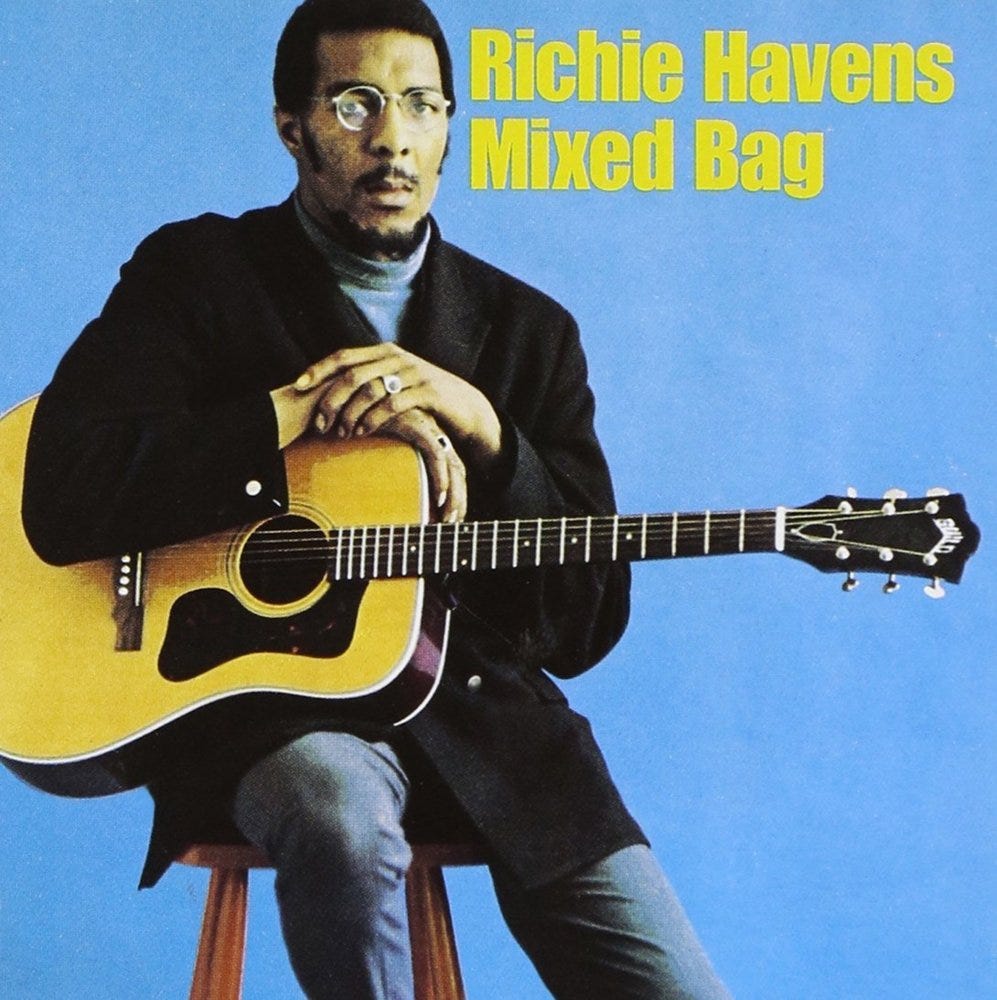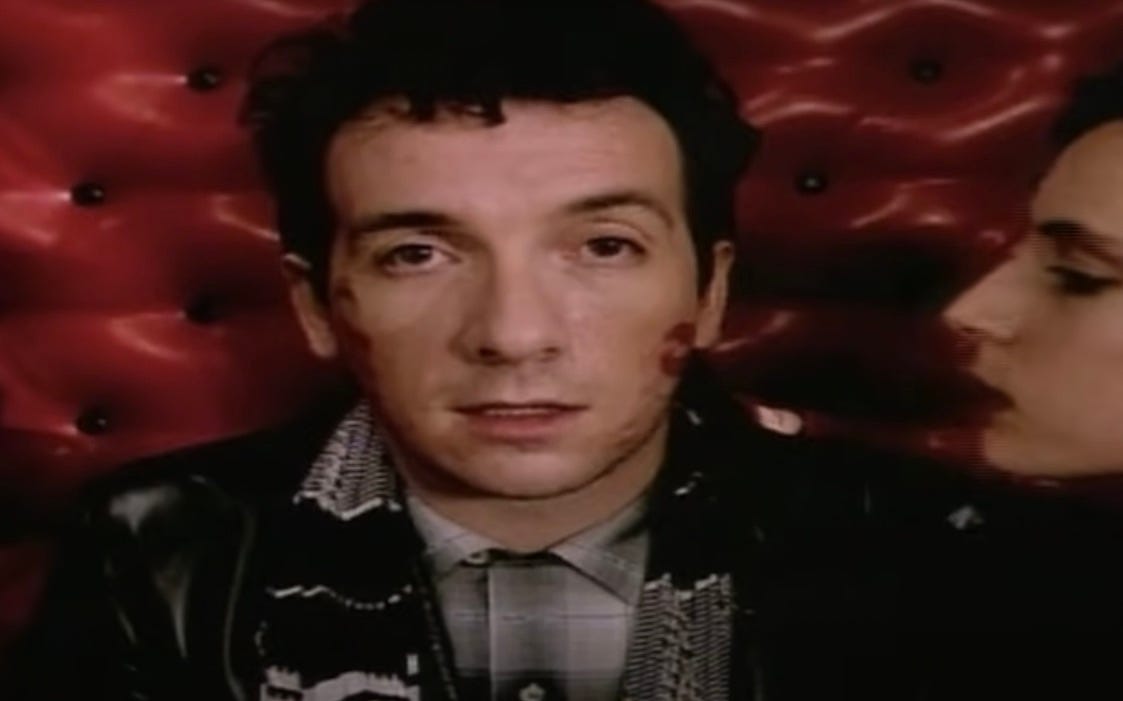Hello! Thank you for signing up to, or stumbling on, this no-news-newsletter written by me, Ashley Clark. If you do choose to subscribe—and it’s free—you’ll receive bulletins about whatever’s on my mind: usually some combination of art/film/music/literature/football. If that sounds good, hit the button!
This week’s letter is a bit of a mixed bag—a phrase I can’t write or hear without thinking of the above sleeve art for American singer-songwriter Richie Havens’ 1966 debut studio LP. It’s the only cover I know where the artist’s facial expression acts as a tacit endorsement of the least charitable reading of the title. “Is it good, Richie?” “Bit of a mixed bag to be honest, mate.”
Anyway, honesty can be refreshing: look no further than Elvis Costello, who began his characteristically erudite sleeve notes for the deluxe reissue of his (and The Attractions’) 1984 LP “Goodbye Cruel World” with the words: “Congratulations! You've just purchased our worst album.” He’s being (in part, at least) disarmingly self-deprecating, and there are many reasons to admire the record, including the remarkably vulnerable “I Wanna Be Loved”, a cover of an obscure but beautiful soul track first recorded in 1972 by Teacher’s Edition.
Costello replaces the languid pace and lush, swirling string arrangements of the Teacher’s Edition cut with a blockier, bouncier synth-washed sound, lashings of glutinous sax, and ethereal backing vocals from Scritti Politti’s Green Gartside, but the song is no less affecting for it. It’s one of my favorite Costello vocal performances, his plaintive and raw delivery stripping lines like “Why must I be so lonely?” of any maudlin self-indulgence. (From those same sleeve notes: “It must suffice to say that I began the year as a married man and after a fraught and futile period, I found myself living alone by the time this record was released.”)
For some reason it took me ages to discover the video for “I Wanna Be Loved”, an unusual and genuinely haunting effort in which Costello, sitting inside a train station photo booth, stares down the camera lens while performing the song, sometimes singing live over the track as well as lip-synching. As he does so, various people enter the frame, mostly in combinations of two—one from either side—whispering, blowing in his ear, or kissing him on the cheek.
At times, Costello appears completely distraught, and is seen at one point removing his spectacles and wiping tears from his eyes. The “cinematic” denouement, when Costello leaves the booth and the camera pans up and away as he leaves the train station, offers scant relief from the emotional intensity of what’s come before.
As it happens, the director of the promo, Evan English, made Costello stay up all night before the shoot with the specific intention of provoking an overwhelmed response (the band also happened to be on tour in Australia at the time.) Of the video, Costello has said that “it is the only one [of my videos] that I feel really adds anything much to the performance.” It has certainly stuck with me ever since I first saw it, and I see its DNA in later videos like Sinead O’Connor’s stark “Nothing Compares 2 U” (directed by John Maybury), and U2’s “Numb” (directed by Kevin Godley)—there’s enough else happening in “Numb” to circumvent rip-off accusations, but it is strikingly similar, conceptually-speaking.
Earlier this week, I found myself in the curious position of standing in a corridor, trying to explain Jimmy Nail to an American colleague. Why? Well, said colleague Clyde Folley has curated a terrific “80s Horror” series for the Criterion Channel—you can listen to Clyde elucidate on the series at WNYC’s All of It here and here—which includes big hits mixed with an array of ghoulish hidden gems. Few are more ghoulish or hidden than Harley Cokeliss’s Dream Demon (1988), a low-budget British shocker which stars Timothy Spall and Jimmy Nail as a pair of sleazy journalists.
Obviously, as a Brit of a certain age living in America, I found it funny that Nail—frozen in my mind as a once-ubiquitous, none-more-90s totem of English popular culture—suddenly surfaced Stateside in a professional capacity, and I wanted to convey the reason for my amusement. Alas, my words were garbled, hurried, and I don’t believe I’ve ever seen a more kindly uncomprehending facial expression than Clyde’s after I’d asked him “Have you ever heard of Auf Wiedersehen Pet?” (For some reason I even said it in a Geordie accent.)
In search of an easy way to capsulize Nail for Clyde, I Google-stumbled upon an absolute pop culture goldmine: the “Populist” project by writer Tom Ewing, who reviewed every #1 single in the UK charts single from 1952 through 2003. (I had “Populist” bookmarked years ago, but for some reason never got around to diving in properly.) One such #1 single is Jimmy Nail’s “Ain’t No Doubt”, a sort of hardnut funk ditty which topped the charts on 18th July 1992. The song, with its irresistibly corny “she’s lyin’” call and response bit, was a big favorite in our house—my maternal grandmother, like Nail, hailed from Newcastle, and was the biggest cheerleader of all*.
Ewing’s summation of “Ain’t No Doubt” is emblematic of the writing style that characterizes the whole project: witty, personal, learned, combative, concise. Here’s a brief excerpt:
“Ain’t No Doubt” … is a one-of-a-kind meeting of pub rock and swingbeat: ruminative, finger-pointing spoken passages broken up by a two-fisted funk chorus that lunges at you like a closing time drunk… Here’s the really strange thing: it kind of works. The lurching production is so awkward, its singer so ill-at-ease, it makes Nail’s spoken passages rawer – this is a man happy to humiliate himself if it gets the message about his partner’s perfidy across. Contrast his lumbering with the smooth replies from the ever-professional Sylvia Mason-James, quite at home in this setting: it’s as if Jimmy’s barged into the disco on a girls’ night out to shame his lady, and we’re onlookers peeping through our fingers.
I’ve become a bit addicted to reading “Populist” in the last few days, hurtling down memory lane in the vehicle of Ewing’s prose, delighting at his pithy descriptions of stars of yesteryear. Take Right Said Fred, an act today most famous for their hardline anti-vaccine Twitter presence, but who once “enjoyed a remarkable level of goodwill, which didn’t really fade until their second album came out and people realized there actually wasn’t room in their life for Black Lace with an extra member and half the hair.” Thanks for your work, Tom—I’m going to read every single entry!
As for Nail, I confess that, until I was reminded by Wikipedia in the course of writing this letter, I had completely forgotten—and so had you, admit it—that Nail had a significant role as crooner Agustín Magaldi in Alan Parker’s Evita (1996), and therefore may be a smidgen more familiar to American audiences than I had thought.
*Prefab Sprout’s Paddy McAloon wrote a number of songs for Nail’s hit TV show Crocodile Shoes, including the lovely, just the right side of sentimental “Blue Roses”, a big fave of my Grandma. McAloon is from County Durham, a few miles southwest of Newcastle.
I’m going to leave you with something fun but incredibly puerile: a swaggering 1971 soul track by The Beginning of the End called “Funky Nassau” (featuring a bass riff later sampled by The Roots in “Table of Contents Parts 1 & 2”) that in my house goes by the name “Fuckin’ Asshole” because—well, you listen to the final minute and tell me what it sounds like:
Until next week!
Thank you for reading. Please consider subscribing to this newsletter if you’ve yet to do so, or, if you have, spreading the word. I appreciate it!







![Jimmy Nail [Evita] 8"x10" 10"x8" Photo 59540 | eBay Jimmy Nail [Evita] 8"x10" 10"x8" Photo 59540 | eBay](https://substackcdn.com/image/fetch/$s_!47sC!,w_1456,c_limit,f_auto,q_auto:good,fl_progressive:steep/https%3A%2F%2Fbucketeer-e05bbc84-baa3-437e-9518-adb32be77984.s3.amazonaws.com%2Fpublic%2Fimages%2Fdda4a67d-da09-41b4-9ab6-a6201dea0a72_500x331.jpeg)
hadn't run into Richie Havens OR that Elvis Costello track. enjoying both, cheers!